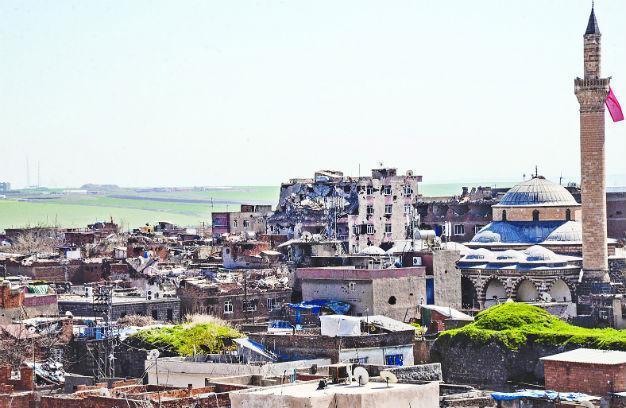Turkish parliament approves omnibus code despite opposition calls
ANKARA

AFP photo
The Turkish parliament has adopted a government-led omnibus bill which includes various legal arrangements concerning issues such as rebuilding the conflict-hit Sur district in the southeastern province of Diyarbakır, the assertive “Kanal Istanbul” project, which foresees the building of a giant canal on Istanbul’s European side to ease the aquatic traffic of the city’s busy Bosphorus Strait, the employment of 15,000 police officers and the prevention of terrorism financing.The omnibus code, approved late on April 14, brings in a new definition, “waterway,” which grants a legal framework to Kanal Istanbul, one of Turkey’s largest infrastructure projects, which is promoted by the government and President Recep Tayyip Erdoğan.
Erdoğan says low buildings will be constructed on the banks of the waterway.
Main opposition Republican People’s Party (CHP) deputy leader Seyit Torun said during the debate in parliament that the project would open vast areas to unearned benefits.
Also included in the code was the employment of 15,000 people by the police department, in addition to 26,120 people who will be employed at the Social Security Institution to increase inspections and fight against unregistered economy.
Those who benefit from general health insurance will be exempted from premium payments until they reach the age of 25.
According to the code, companies that employ citizens who benefit from social aid from the Family Ministry will receive support in their insurance premium payments. The CHP strongly opposed the change, saying this would benefit companies, not people.
Southeastern district to be rebuilt
Under the code, large urban areas, such as Sur and the Cizre district in the southeastern province of Şırnak, which suffered severe damage during months of fighting between Turkish security forces and the outlawed Kurdistan Workers’ Party (PKK), will be rebuilt. Sur, parts of which are a UNESCO World Heritage site, was particularly badly hit. The new code allows for a restructuring project in Sur. However, the Kurdish problem-focused Peoples’ Democratic Party (HDP) has been reacting to the “urgent expropriation” decisions for restructuring project in such towns, arguing this may turn into “punishment” for the locals.
Also included was authorization for the state to appoint a board of trustees to companies as part of the struggle against terrorism financing. It is also authorized to wiretap companies in such cases.
A major change was about the traffic insurance code, which used to prioritize the general debt code under the framework of Treasury regulations. Now the items in contracts between insurance companies and their customers will be prioritized.
Trade unions and confederations are now allowed to aid the relatives of fallen soldiers and wounded soldiers under condition this aid will not exceed some 10 percent of their overall cash.
Companies are allowed to divide the annual leaves of workers into three parts, under condition the leaves will not be under 10 days.
Tourism facilities, which borrowed state plots in 2016, are permitted to postpone rental or other fees for one year in a bid to boost tourism.
The omnibus code also regulates the salaries of disabled and elderly citizens.
















